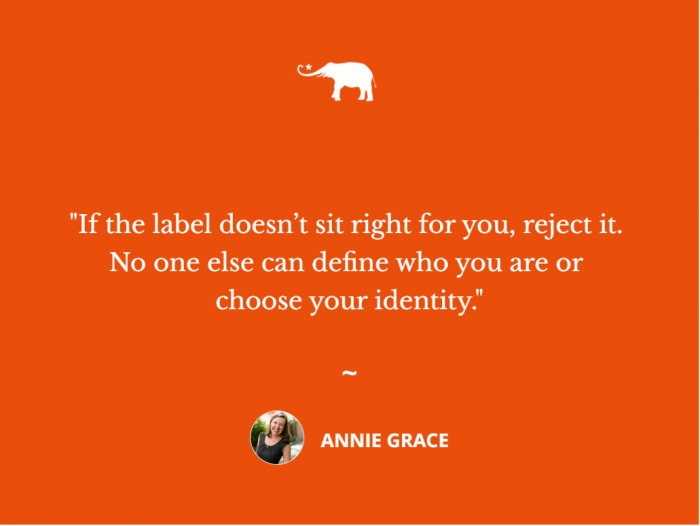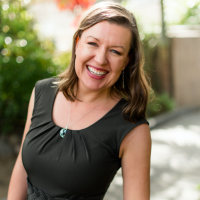View this post on Instagram
One of the things many people find most controversial is when I say, “I will never call myself an alcoholic.”
The heated responses I get to that statement could keep my house warm and toasty through an entire Colorado winter!
The most popular one is, “You’re just in denial!” People also love to tell me that I’ll never recover if I don’t admit that I am indeed an alcoholic.
It’s been over six years since I last drank alcohol and I’ve never once desired a drink during that time, so I feel quite confident that I’m neither in denial nor in danger of going back to drinking.
Here’s the thing—it does not bother me if someone chooses to label themselves an alcoholic. Or a shopaholic. Or whatever it is they may identify as. What does bother me is someone else thinking they have the right to tell me what I am, how I feel, or what controls me.
Labels can be incredibly restrictive, especially when they are assigned to us by someone else. They create limiting beliefs, which convince us that we must live within these preconceived barriers that someone else put around us. Personally, I feel like that is just no way to live.
That is how I felt about the label of alcoholic over seven years ago and it is how I still feel about it to this day.
When it comes to labeling oneself as an alcoholic, there is no set definition or diagnosis. The criteria for when one crosses that arbitrary line from drinker to alcoholic just does not exist. Often, people are told that they must self-diagnose or self-identify as an alcoholic. They will just know if they are one!
Well, it is no wonder that the accusations of being in denial often accompany the talk around the label. Could you imagine going to a doctor regarding a possible cancer diagnosis and being told that you must decide for yourself whether or not you have cancer? The idea seems ludicrous but often with drinking you’re told just that.
I don’t identify as an alcoholic, especially now that I stopped drinking and am no longer a drinker. I do identify as a person who had an addiction to alcohol. Getting to the point where I could acknowledge that as my truth took much longer than it should have.
All because of that label. Alcoholic.
I had a friend who I would drink with all the time. It was just what we did when we were together. Matching each other drink for drink. Until one day she came over and as I went to break out the wine she said to me, “Oh no, Annie. I stopped drinking. I went to AA and realized that I am an alcoholic.”
I was floored. If she was an alcoholic, what did that mean for me? Did it mean I was also an alcoholic? If I was easily keeping up with her, I must fall into the same category. Instantly she reassured me. “Annie, I have learned this about myself, and you’re just not an alcoholic.”
To her, my drinking wasn’t the same as hers. I drank differently. I could take breaks. I was crushing it professionally. That placed me in a separate category and, in a weird way, gave me permission to keep drinking. If a self-proclaimed alcoholic could tell me that my drinking wasn’t a problem, obviously I was doing just fine.
Even if deep down, I knew differently. I knew I had a reason to be concerned about my drinking. And if I wasn’t an alcoholic, if the label didn’t fit me, what was I?
You see, labeling doesn’t just limit the haves. It also limits the have-nots. What happens when you fall into the in-between?
That is where I was trapped. Limited because everyone was telling me I didn’t belong in that group—the “real alcoholics.” And yet, I knew that there was no way I could keep drinking the way I had been.
I felt completely helpless and trapped. My chances of living a happy, fulfilled, normal life without drinking seemed impossible. The idea of quitting absolutely terrified me. I didn’t know what to do about it. It was easily one of the hardest and most painful experiences in my life.
If over 65 percent of adults in the United States drink, yet only 10 percent fall into the physically addicted category, how do we define and help all those who exist in that nether. How do we reach them without labels and limits?
One way we’re doing this is by evolving. We’re moving away from using the term alcoholic. The medical community has adopted the term alcohol use disorder. Alcohol use disorder is a continuum. No longer does your drinking fall upon a cut and dried, have or have not, decide for yourself diagnosis. Now drinking, and drinking patterns, are identified along a spectrum.
It’s now safe to question your drinking long before you hit rock bottom and to say, “You know, I want to address this before this thing, this addiction takes a stronger hold on me.”
Removing that barrier to access, removing the limits that label can create, brings such freedom. By taking away the scary title of alcoholic, one can approach this in the same way they would any other health choice they make. I’m not limited or deprived by choosing not to drink. It’s an empowered decision, similar to the dietary changes people make when they fall upon the spectrum of prediabetic or prehypertensive.
Labels might just be words but they can carry an enormous psychological impact. If the label doesn’t sit right for you, reject it. No one else can define who you are or choose your identity.
~
Join us in the forever free Alcohol Experiment if you’re ready to take a look at your relationship with alcohol. Do it because you want to feel healthier. Do it because you want to feel happier. Do it because you can—without any fear about wearing a label!
~









Read 3 comments and reply